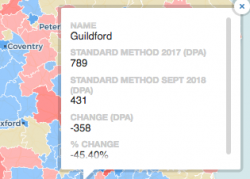 Abraham Lincoln
If given the truth, the people can be depended upon to meet any national crisis...
Abraham Lincoln
If given the truth, the people can be depended upon to meet any national crisis...
 Guildford news...
for Guildford people, brought to you by Guildford reporters - Guildford's own news service
Guildford news...
for Guildford people, brought to you by Guildford reporters - Guildford's own news service
Letter: Guildford Was Nominated as a ‘Growth Hub’ Long Before the Local Plan
Published on: 2 Oct, 2018
Updated on: 1 Oct, 2018
In response to: Revised Population Forecast Leads to Calls for Review of Local Plan Housing Numbers and related readers‘ letters
I am writing in response to recent articles concerning the change in predicted housing need following the revised data from the Office of National Statistics (ONS).
Personally, I think it is always good to hear alternative points of view when they are properly supported. As others have pointed out, very few supported the Local Plan that didn’t have a vested interest in it, and it cannot be presumed that the silent majority agree.
I agree with Julian Lyons response to Andrew Lainton and whilst I understand the gist of Mr Lainton’s comments I couldn’t quite make out whether I was in Alice in Wonderland or the Emperor’s New Clothes!
Yes, a degree of growth is required to keep up with changes in population and modern lifestyles but if the amount is determined by those with vested interests at the expense of facts and the views of the wider public (young old and in-between) then it is indeed a sorry state of affairs.
Pre-determination’ is taboo in planning when it comes to assessing applications, yet Guildford was nominated as a “growth hub” long before the so-called “need” or evidence had been produced.
Understanding what benefits this pre-determined assignation will bring to Guildford when balanced against the costs is surely an essential part of the equation but this question has remained unanswered.
A few points for consideration:
Guildford’s MP and many councillors were elected because of their promises to protect the green belt, so yes, people have a right to be upset to find that the majority of development is planned for green belt.
Guildford is only one of many authorities that plans to build more than is needed to encourage growth and to upset the supply and demand ratio, on the basis that this will bring down the price of housing. This is already leading to unwanted consequences.
If you add up the housing targets across England, the number of houses being built appears to far exceed the need. Builders will not build if they can’t sell and won’t build if house prices are falling, so expect to see more land banking unless incentives are put in place to destabilize the market, which will undoubtedly lead to a rise in negative equity and repossessions.
As is evident already (The Times – Market Intelligence report of September 28) there is now a shortage of rental properties, which currently affects those in greatest need and those at the top end of the housing market who don’t wish to risk the capital tied into their property at these times of uncertainty and hence are selling despite the prohibitive stamp duty that is partly responsible for the lack of movement in the housing market.
Policies shouldn’t revolve around the needs of universities. They should be (and hopefully are) pitched the other way around, ie what jobs does this country need and how can they best be provided? If more emphasis was placed on quality vocational training programmes, young people could earn more quickly and not be saddled with huge debts that impact the ability to buy.
Promoting growth in areas where there is surplus truly affordable housing and good universities and where people need and want such growth would seem to be sensible but the very mention is met with cries of Nimbyism (a derogative term presumably designed to silence homeowners in the south as these areas are primarily in the North)?
The message relating to the “housing crisis” has been largely portrayed as a housing shortage and only more recently has the ability to pay been seen as the primary issue. Andrew Lainton points out the changes in new household formation that have affected the new ONS predictions and no doubt, analysts will apply ‘uplifts’ to account for that.
What is not mentioned is that this is only one of a number of reasons why the prediction is lower. Brexit, uncertainty in the housing market, slower birth rates, flat-lining of life expectancy and an increase in same-sex households as well as ability to pay and overestimation in the previous prediction, have all contributed to the change.
Building more houses is not the solution for everything and there appears to be as many if not more papers that state that increasing supply of housing per say (particularly within a 90-minute radius of London) will not bring down prices (see Solving the Housing Crisis by D Valentine, Bow Group).
Local Plans are, in my view, a complete misnomer. They have pitched town and country dwellers within the borough against each other, they have pitched boroughs against each other and have taken up years of man hours and heavens knows what the cost is across the country (especially if you take into account the appeals and judicial reviews that have occurred due to opacities in interpretation).
Despite the name, the opinions of those with vested interests appear to take precedence and at the end of the complex process, it appears that no-one is responsible for what ensues, as councils blame the government and vice versa.
The Local Plan debacle along with the Brexit fiasco had left me somewhat aghast and hoping that a more centered party with a common sense approach that we can all get to grips with emerges from somewhere before the next election.
Responses to Letter: Guildford Was Nominated as a ‘Growth Hub’ Long Before the Local Plan
Leave a Comment Cancel replyPlease see our comments policy. All comments are moderated and may take time to appear.

See Dragon story: GBC’s Explanation of Major Land Sale Notice Error ‘Borders on Arrogant’ Says Councillor






Recent Articles
- Guide to Telephone Befriending Services for Older People
- Stage Dragon: Sleuth at the Yvonne Arnaud Theatre
- Guildford Lido All Set for the 2024 Season
- Appointment of Permanent Joint Strategic Director of Finance Confirmed
- Police and Crime Commissioner Candidate Interview – Alex Coley
- New Approach to Mental Health Concerns Reported to the Police
- Letter: Bernard Quoroll ‘s Insight Should Be Heard
- Police and Crime Commissioner Candidate Interview – Paul Kennedy
- Staff Union Warns Surrey University of No Confidence Votes
- Invitation to Join Mass Bike Ride on Saturday, April 27


Recent Comments
- Bibhas Neogi on M25 Junction 10 Project Required Major Engineering to Overcome Pipeline Snag
- Roland Dunster on Birdwatcher’s Diary No.302
- J Davies on Insights Part 3: The Council Should Not Be Marking Its Own Homework
- Angela Richardson on Insights Part 3: The Council Should Not Be Marking Its Own Homework
- Peter Wilkinson on Anger Over Traffic Impact of Golf Club Scheme
- Nicola King on Anger Over Traffic Impact of Golf Club Scheme
Search in Site
Media Gallery
Dragon Interview: Local Artist Leaves Her Mark At One of England’s Most Historic Buildings
January 21, 2023 / No Comment / Read MoreDragon Interview: Lib Dem Planning Chair: ‘Current Policy Doesn’t Work for Local People’
January 19, 2023 / No Comment / Read MoreA3 Tunnel in Guildford ‘Necessary’ for New Homes, Says Guildford’s MP
January 10, 2023 / No Comment / Read More‘Madness’ for London Road Scheme to Go Ahead Against ‘Huge Opposition’, Says SCC Leader
January 6, 2023 / No Comment / Read MoreCouncillor’s Son Starts Campaign for More Consultation on North Street Plan
December 30, 2022 / No Comment / Read MoreCounty Council Climbs Down Over London Road Works – Further ‘Engagement’ Period Announced
December 14, 2022 / No Comment / Read MoreDragon Interview: GBC Reaction to the Government’s Expected Decision to Relax Housing Targets
December 7, 2022 / No Comment / Read MoreHow Can Our Town Centre Businesses Recover? Watch the Shop Front Debate
May 18, 2020 / No Comment / Read More







Valerie Thompson
October 2, 2018 at 2:57 pm
But we all know that the houses that are needed are for downsizers, starter-homes and accommodation for lower-paid key-workers in health and service industries.
How can this be achieved? Housing Associations are very good at doing this and, in the past, councils built council houses. It is time that these needs were recognised by GBC, and money, currently being directed towards university accommodation should be redirected into the public sector.
It may be everyone’s desire to own a house, but those of us born in the 40s, 50s, 60s, and 70s mostly began in rented properties, while we saved hard to get a mortgage. My father bought his first flat when he retired! It used to be the accepted norm.
GBC’s plans for out-of-town developments will not fulfil this need, but bring in yet more commuters living in four- and five-bedroom homes, totally unaffordable by those whose need has been identified.
We also know that the best place for these homes is in the town centres, avoiding commuting.
Jules Cranwell
October 3, 2018 at 6:43 pm
Words of great wisdom from Mrs Thompson. My folks spent their entire careers renting around the world as ex-pats, living in rented homes, and also. Ought their first home in the UK on their retirement. I worked as an ex-pat, renting for 20 years to afford a starter home on my return to Blighty.
The Tories and the GBC executive are working under the false assumption that everyone has a God-given right to own a home. This is a very British thing, with most of our European neighbours quite happy to rent from a landlord than pay rent to wealthy bankers, in the form of a mortgage.
Mrs Thompson is spot on that this plan will not provide any truly affordable homes to those so desperately in need, as 80% of prevailing Guildford prices are self-evidently not truly affordable. What we need is social housing, not a donation of £80 million of our money to the university.